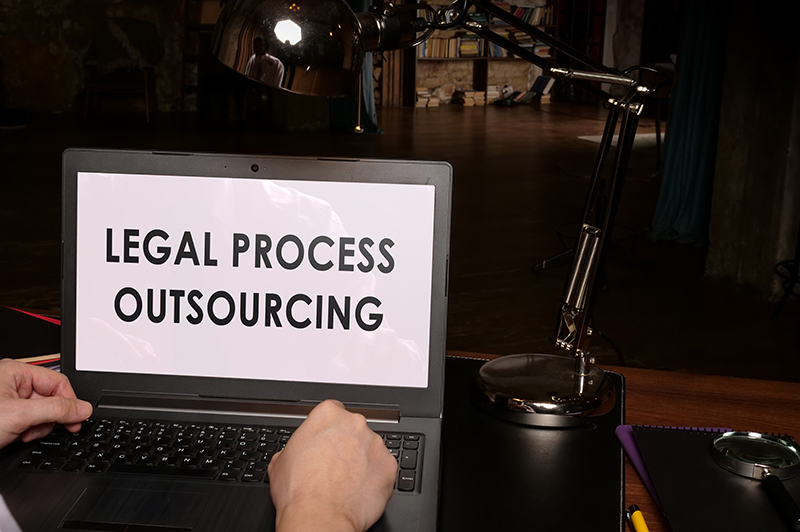The legal profession is stressful. Lawyers often work long hours and sometimes need to take work home. Handling cases of all kinds, preparing and filing court documents, checking and replying to e-mails, interacting with clients, and attending an endless number of meetings can be overwhelming for any law firm. Legal process outsourcing (LPO) is a smart solution that can ease these challenges. It involves entrusting specific tasks, including administrative functions, document conversion, legal research, legal document creation, and more to an external contractor. Outsourcing allows lawyers to focus on their core competencies, serve their clients better, and grow their business.
Benefits of LPO
LPO is growing. The global Legal Process Outsourcing (LPO) market size is expected to reach USD 72090 million by 2027, from USD 10560 Million in 2020, at a CAGR of 31.6% during 2021-2027, according to Valuate Reports. The reasons for the growth of LPO are:
- Saves money and resources – When a law firm’s workload increases, expanding office space and hiring additional full-time staff can be very expensive. LPO allows you to leverage expertise and get your work done at cost-effective rates.
- Access to expertise and advanced technologies – Services are available for legal research, e-discovery, legal coding, and more. Legal process outsourcing companies work with the latest technologies to ensure precise, timely solutions.
- Time to focus on core operations – Outsourcing non-essential tasks allows lawyers to focus on their clients.
- Improves work-life balance – With the right support, busy lawyers can find more time for leisure and reduce stress.
Let’s see what tasks law firms can outsource.
Common Areas for Legal Process Outsourcing
- Document management: Managing documents is much easier when they are in electronic formats. Document scanning and conversion solutions for law firms involve converting files into various digital formats. LPO companies provide everything from data entry and paper migration to document scanning, OCR conversion, and microfilm and microfiche scanning. By implementing an electronic management system, lawyers can easily retrieve and access the information they need at any time and from any location, which can increase the productivity and efficiency of law firms and their staff. These advantages have become even more significant with the rise of remote work.
- eDiscovery: Support for eDiscovery makes electronically stored information (ESI) easily manageable. Data is collected and potentially relevant information is extracted, indexed and placed in a database. Document review is an important part of the eDiscovery process. LPO companies have experienced and trained teams using sophisticated technology to handle this time consuming and tedious task. Outsourcing document review makes it easy to find documents relevant to a case. Efficient support for processing, filtering and organizing legal documents provides lawyers with better control over their important documents and streamlines office workflow.
- Litigation coding: This process is the creation of keyword data or a summary from a document. Advanced technologies like OCR are used to facilitate the conversion of documents into readable, editable text. It allows for capturing and indexing documents in chronological order, which makes sorting and searching for documents in a database easier. Solutions provided by LPO companies include document text coding, summarized coding, bibliographic coding, subjective coding, inventory coding, and objective coding.
- Legal research: Legal research is an essential part of preparing for litigation. Lawyers need to retrieve the information to support legal decision making. This would involve collecting viable law references, and incorporating citations to statutes and other similar cases in the briefs presented in court. Outsourcing this exhausting and time consuming task allows lawyers to find more time for their core legal activities. LPO services are available for statutory research, case law research, legislative history research, medical record research, multi jurisdictional research, analysis and surveys, document retrieval, appellate records, and formal presentations.
- Contract drafting: Law firms can outsource the drafting of various types of contracts – from employment contracts, non-disclosure agreements and lease contracts to the website privacy policy, research agreements, eCommerce agreements and partnership contracts. Outsourcing this complex and time-consuming task ensures precise drafting, which is crucial to avoid the risk of errors that can adversely impact litigation.
- Medical record review: Medico-legal lawsuits require lawyers to review thousands of medical records to understand the key facts to prepare for trials. Outsourcing medical records will ensure professional support for chart review, sorting and categorizing medical records, and indexing and bookmarking. Other services include medical record organization and analysis, developing comprehensive medical summaries, and clinical summary/peer review.
The range of litigation support services has expanded. According to a report in The National Law Review, legal process outsourcing companies now provide support for legal client intake, court appearances, staffing, IT, and marketing automation. A recent law.com report confirms this trend and says that law firms are now outsourcing “high-value functions,” including technology software and infrastructure.
“Big Law is embracing outsourcing. Not only are more firms doing it, but the industry is outsourcing a growing number of high-value departments, often shedding administrative and operations employees in the process. The decisions carry some risk, but also big rewards”, notes the report.
Choosing the right partner is important if your law firm is considering outsourcing solutions. When outsourcing services that are considered “core” to the business, it is important to review the work received, and ensure that it meets quality standards. Also, proper research on the chosen legal process outsourcing company is essential as LPO raises security and confidentiality challenges that are usually different to other types of outsourcing.




